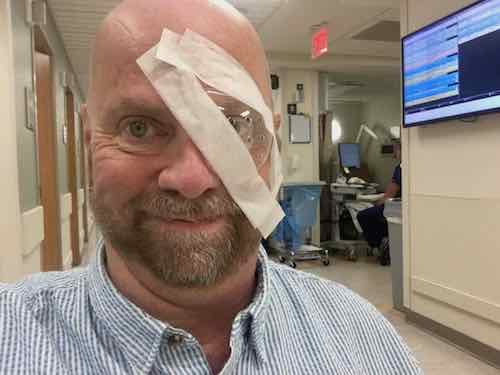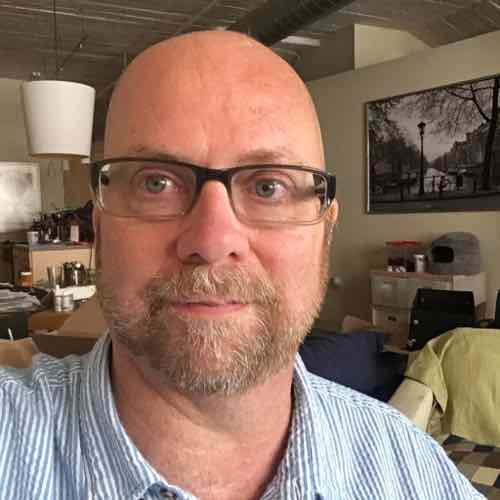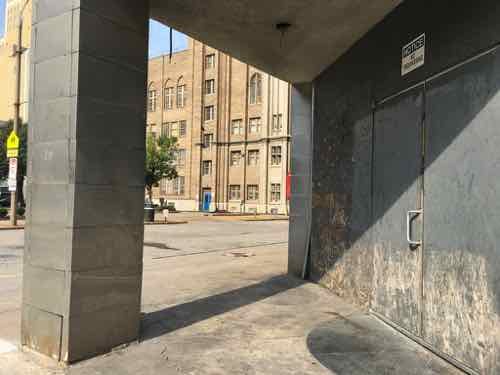My Vision Is Better Than It Was On Sunday!
Sunday’s non-scientific poll was about vision. My poll answers are still the same, but my vision is better today than it was on Sunday. Monday morning I had outpatient surgery on my left eye to remove the cataract.
A cataract is a clouding of the lens in the eye which leads to a decrease in vision. Cataracts often develop slowly and can affect one or both eyes. Symptoms may include faded colors, blurry vision, halos around light, trouble with bright lights, and trouble seeing at night. This may result in trouble driving, reading, or recognizing faces. Poor vision caused by cataracts may also result in an increased risk of falling and depression. Cataracts cause half of all cases of blindness and 33% of visual impairment worldwide. (Wikipedia)
Over a decade ago, not long after my stroke, I was diagnosed with early cataracts — my lenses were just beginning to cloud over.
Like the myth about the frog in boiling water, the change is gradual. Myth because the frog would notice and would jump out. Over the years I’d learned how to compensate — going into a building because I couldn’t see my phone’s screen outside, having apps set on the largest text option, not driving when glare would be an issue. This year I jumped out of the pot and asked my physician to refer me to a specialist. The first ophthalmologist that examined me agreed both lenses should be replaced, I just needed to come back to make sure the surgeon concurred.

She did, no prescription would help me see as well as I should. On Monday I got a new lens in my left eye — it also corrected my near vision. Colors are more vivid, everything is sharp now.
The right eye will hopefully happen soon. I’ll still wear glasses for distance. Cataracts runs in my family — my mom had it, as did her mom. My dad had it. My two older bothers both have it, though the oldest has had one lens replaced. For some, like me, it starts earlier and progresses faster. Lucky me…
Through all this I thought about a 60 Minutes story from April 2017 — two US doctors who travel to other countries to perform the surgery I just had:
U Myint Oo hadn’t seen for two years, until this moment. Others here had been blind for decades. They all had cataracts – a milky, white build-up of protein that clouds the lens of the eye. In the U.S. they mainly afflict the elderly; removing them – a routine operation. But here in Burma, also known as Myanmar, cataracts go untreated and blindness is a way of life. (CBS News/60 Minutes)
Yes, left untreated cataracts gradually leads to blindness. This is why my maternal grandmother had her cataracts surgeries in the early 1960s — back then it was a major operation that required hospitalization — and it didn’t correct vision — just removed the clouded lens. She wore thick glasses, but wasn’t blind. A few years later Dr. Charles D. Kelman’s research changed the process:
In 1967, the phacoemulsification procedure was introduced. Instead of making a large incision in the eye and removing the lens, doctors could make a tiny one. Then they inserted an ultrasonic tip which, vibrating thousands of times a second, broke up the cataracts without damaging the surrounding tissue. The remains of the cataract were suctioned out.
The procedure, which Dr. Kelman taught to thousands of doctors around the world, is now performed more than a million times a year in the United States alone. Artificial lenses that he developed in the 1970’s are now routinely implanted in patients’ eyes, making unnecessary the ultrathick glasses that once were common after surgery. And his ultrasonic approach has been adopted in other fields of medicine, including neurosurgery. (New York Times)
Both of my parents, already in their 70s, had both eyes done in the 2000s. I recall my mom being so thrilled — something I can finally understand. Sadly, she died just a few years later. After my mom died my dad had both of his cataracts removed, but was hospitalized & died just after the 2nd — completely unrelated to the cataract surgery. Getting mine done at 51, I hope to have many more years of enjoying good vision again.

Cataracts is one of the big four causes of adult blindness/low vision:
Four eye diseases — age-related macular degeneration, diabetic retinopathy, glaucoma and cataracts — account for most cases of adult blindness and low vision among people in developed countries. Unlike many other ailments associated with aging, they cause no pain and often no early symptoms and thus do not automatically prompt a person to seek medical care. But a thorough checkup by an ophthalmologist can detect them in their earliest stages, followed by treatment that can slow or halt their progression or, in the case of cataracts, restore normal vision.
Macular degeneration, a leading cause of vision loss in Americans 60 and older, involves an irreversible loss of retinal cells that robs people of the central vision needed to read, watch a TV program or identify a face or object in front of them. There are two types, dry and wet. In the dry type, the light-sensitive cells in the macula, a structure near the center of the retina, gradually break down. In the wet type, abnormal blood vessels grow under the macula.
Steps you can take to lower your risk of macular degeneration or slow its progression include not smoking, eating lots of dark leafy green vegetables, wearing sunglasses to block ultraviolet light, and taking one or more supplements formulated to support macular health. There are also treatments specific for wet A.M.D., including laser surgery, photodynamic therapy and drugs that are injected into the eye to slow the growth of abnormal blood vessels.
Diabetic retinopathy, the cause of most blindness in American adults, also affects the light-sensitive retina, damaging the vision of more than half of people with diabetes age 18 or older. The most effective preventive is maintaining a normal level of glucose in the blood through medication and a proper balance of diet and exercise. Blood glucose should be routinely monitored, high blood pressure effectively treated and smoking avoided entirely.
Glaucoma, another leading cause of blindness, involves a rise in fluid pressure inside the eye that damages the optic nerve. It affects more than four million Americans, about half of whom don’t know they have it, and is especially common among African-Americans and Hispanics. It can be detected with a comprehensive eye exam, which should be done annually for African-Americans and those with a family history of the condition.
Although glaucoma is not curable, treatment to lower pressure in the eye with prescription eye drops and, in some cases, pills or surgery can control the condition.
Cataracts are the most common cause of vision loss among people over 40. They involve a gradual clouding of the lens, a normally transparent tissue directly behind the iris and pupil that helps to focus images on the retina. As cataracts progress, it becomes increasingly difficult to see clearly, impairing the ability to read, drive or recognize faces.
Preventing or slowing the development of cataracts involves protecting the eyes from sun damage, not smoking, consuming a diet rich in vegetables and fruits and, if you have diabetes, keeping blood sugar under control.
In years past, doctors often advised patients with cataracts to wait until they were far advanced before removing them surgically. This is no longer the case. Cataract surgery is now done when the condition begins to affect a person’s quality of life or interferes with the ability to perform normal activities.
The surgery is nearly always done under local anesthesia on an outpatient basis. If both eyes have cataracts, as is usually the case, the second eye is typically treated some weeks after the first to avoid the rare risk of a postoperative infection in both eyes. The operation involves removing the clouded lens and, in most cases, replacing it with a clear artificial lens that often gives patients better vision than they had even before developing cataracts. (New York Times)
Here are the results from the recent non-scientific Sunday Poll:
Q: How is your vision? Check all that apply.
- I wear prescription glasses: 14 [38.89%]
- I often wear sunglasses: 7 [19.44%]
- I don’t need glasses/contacts: 6 [16.67%]
- I wear prescription contacts: 4 [11.11%]
- I have reduced vision: 3 [8.33%]
- TIE: 1 [2.78%]
- I have cataracts
- I have glaucoma
- TIE: 0 [0%]
- I’ve had laser or other surgery to correct my vision
- I have no vision (blind)
- I have age-related macular degeneration
- I have diabetic retinopathy
If you haven’t had an eye exam in the last couple of years, please do so soon.
— Steve Patterson

